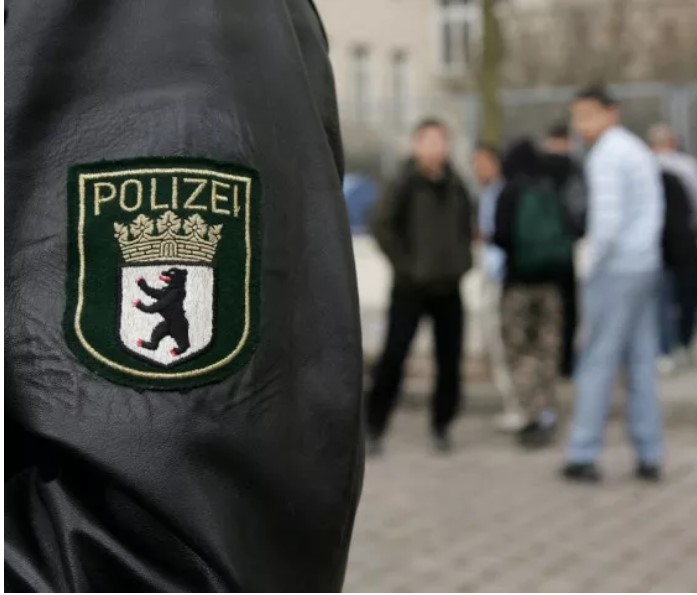On German repression of Palestinian protest
German police action in closing down the Palestine Congress in Berlin is a shocking attack on the Palestine movement and an assault on basic rights of free speech.

On April 12th German police closed down a three-day Palestine Congress in Berlin within minutes of its opening. In a shocking display of repression against Palestinians and their supporters, police stormed the stage, shut down the organisers’ livestream, broke into the control room and shut off the power.
Speakers and participants from across Europe were prevented from sharing their views of Israel’s indiscriminate assault on Gaza. Dr Ghassan Abu Sittah, a British-Palestinian surgeon who spent weeks in Gaza treating injured victims of the war with Israel and was recently elected as Rector of Glasgow University, accused Germany of being an “accomplice to genocide” after he was barred from entering the country to take part in the Congress.
Former Greek finance minister Yanis Varoufakis was not only denied a platform for his intended livestreamed speech; Germany’s interior ministry has also banned him from entering the country, participating in Zoom events hosted there or even having recorded video played at German events. These measures are draconian even in the context of alarming clampdowns on Palestinian expression in Europe and the US.
Germany has designated support for Israel a non-negotiable national interest, or Staatsräson (“reason of state”). The ostensible justification for this is to atone for the Holocaust – to demonstrate remorse for Germany’s genocidal outrage against Jews 80 years ago. But any such intent is completely negated by its repression of protests against a state – Israel – which the International Court of Justice is investigating now for “plausible genocide”. Germany itself is the subject of a Nicaraguan submission to the court calling for an end to its support for Israel’s military machine, which is second only to the USA’s.
We join the UK organisations that have, as part of a global movement, jointly mobilised mass nationwide protests since the slaughter of Palestinians began in October in condemning the German police action as a shocking attack on the Palestine movement and an assault on basic rights of free speech.

‘Germany’s genocidal outrage against the Jews 80 years ago.’ the justification for unequivocal support for apartheid Israel? How does the Bundesrepublik treat the other groups it attempted to erase from the universe in Holocaust? Do they have such militant protection? I do hope so. Perhaps the good folk here could enlighten me? Bless us all.
If anything persuades the ICJ judges to rule against Germany in the Nicaragua-Germany case it might well be the judges’ background awareness of the state’s ongoing repression of Palestinian protest, I think. However, that material wasn’t included in the Nicaraguan case.
Perhaps such material will be in the case against the German government’s behaviour starting Thursday in Germany’s domestic courts.
It’s so heartbreaking South Africa’s legal victory at the ICJ has not yet much improved Palestinians’ security and conditions within Gaza, the West Bank and Jerusalem.
I welcome JVL associating itself with the statement by UK organisations condemning the German authorities for their repressive actions against the Palestine Congress. This is particularly appropriate as one of the main German sponsors of the event was Jüdische Stimme für gerechten Frieden in Nahost (Jewish Voice for a Just Peace in the Middle East). Several Jewish participants were arrested, which has become common during pro-Palestine events.
Federal Interior Minister Nancy Faeser (Social Democrat), expressed her satisfaction with the police action, stating that antisemitic and Islamist crimes and propaganda speeches for Hamas would not be tolerated. At a subsequent press conference, her spokeswoman was unable to give any examples of such acts (none were reported by the media), nor could she explain how the description of Islamism and antisemitism applied to the organisers who included Jews. She refused to comment on the banning orders on Ghassan Abu Sittar and Yanis Varoufakis.
Closure of the Congress had been justified by police based on a video-streamed speech by Ghassan’s 86-year-old uncle Salman Abu Sittar, President of the London-based Palestine Land Society, who they claimed was already banned. According to the Congress organisers they were unaware of any ban; they had cleared the whole programme including the list of speakers with the police beforehand, at which stage the police had raised no objection, but had instead waited until the Congress started before intervening.
The Ministry spokeswoman was also asked about the precedent of a Berlin court judgement that banning orders did not apply to video-streaming, but refused to comment.
A Federal Press Office spokeswoman then assured those present that of course criticism of Israel or Israeli policy can be expressed in Germany and that there are no restrictions on freedom of expression.
Who says the Germans don’t have a sense of humour?